
Makerere University College of Humanities and Social Sciences (CHUSS) has come up with proposals to transform the curriculum in the respective disciplines during the workshop for the research project titled, Historicising Humanities at Makerere University since 1922.
The key goal of the project was to rethink and reshape the role of humanities in Uganda and reexamine the basis and significance of humanities and humanistic sciences at Makerere from a historical perspective
The three year project coming to an end was coordinated by Prof. Josephine Ahikire, Dr. Levis Mugumya, Dr. Edgar Nabutany and Dr. Atekyereza funded by Andrew W Mellon Foundation of New York.
In addition to conducting research and publishing the book, titled, “Historicising the Humanities at Makerere University: Trends, Patterns and Prospects”, the project hosted a number of conversations and conferences including an international humanities conference in August last year.
The book, “Historicising the Humanities at Makerere University: Trends, Patterns and Prospects” is a collection of reflections on selected disciplines in the humanities and social sciences. The book is a contribution by twenty-two authors with sixteen chapters that have taken a slice of the history of some disciplines and raised questions around their basis and trajectory. It is an attempt to renew conversation and debate as well as ideational leadership of the academy.
On 30-31 August 2023, the project team organized a two-days’ workshop dubbed, “Curriculum Transformation Workshop for Humanities and Social Sciences held at the Golf Course Hotel in Kampala.
The purpose of the two day workshop according to Dr. Mugumya was to have conversations on issues that the authors raised in order to improve curriculum development activities. The workshop brought together the authors and academic community in the college in a dialogue to review the book chapters, reflect and hold discussions to generate ideas for curriculum review and development in the respective disciplines
“Most of the Chapters in the book highlight the need to interrogate both the theoretical and pedagogical approaches that have been employed over time as well as recommending the rethinking of the current epistemologies in the humanities and humanistic social sciences disciplines,” Dr. Mugumya said.
During those endeavors, Dr. Mugumya reported that the participants and authors emphasized the idea of reflecting on core values and histories of departments, the narrative of the curriculum and prevailing demand of the place of humanities and employability of the graduates.
Curriculum Review initiative timely in addressing the real-life problems
While officially opening the workshop, the Academic Registrar Makerere University Prof. Buyinza Mukadasi described the workshop as a gathering to interrogate and mature the resolve made while celebrating 100 years of the country's oldest university in a published book.
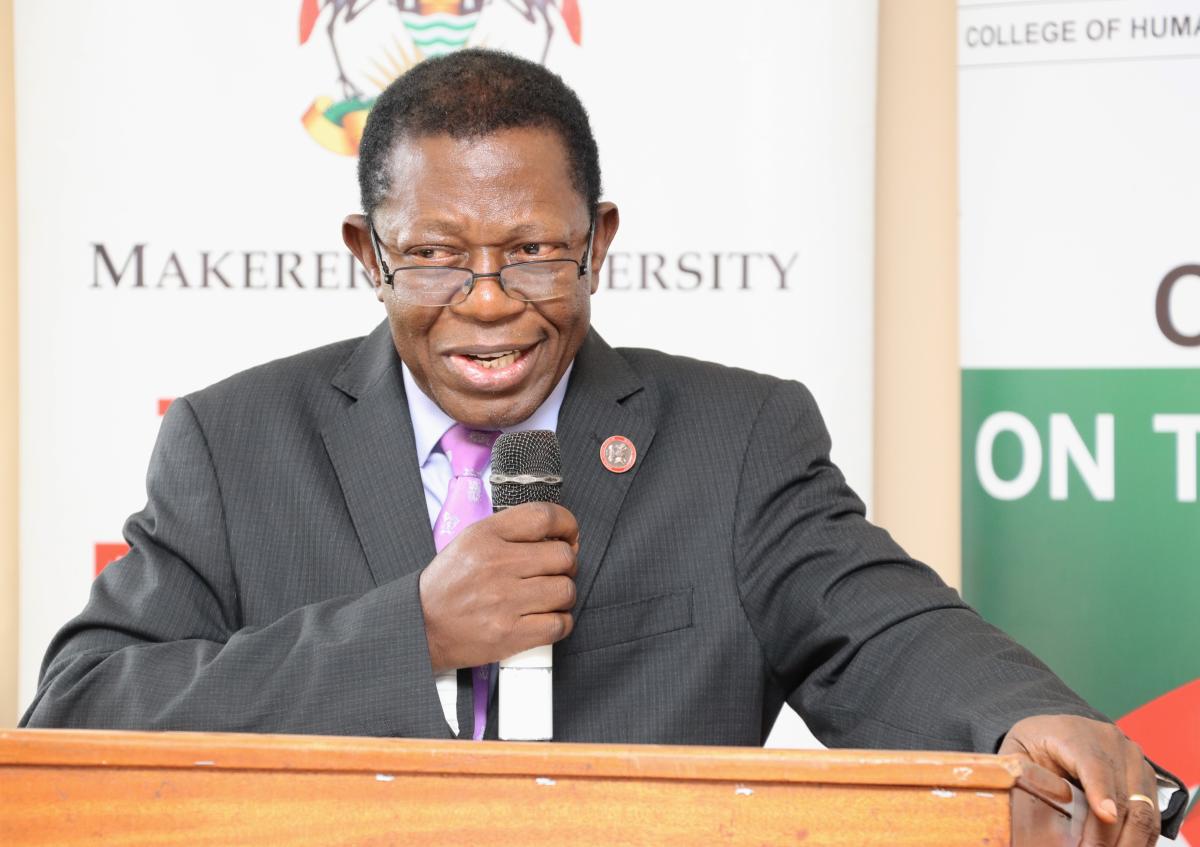 “Allow me to thank the leadership (Principal, Deans and HODs), first and foremost, for the efforts to advance scholarship at CHUSS and at Makerere at large.
“Allow me to thank the leadership (Principal, Deans and HODs), first and foremost, for the efforts to advance scholarship at CHUSS and at Makerere at large.
The workshop aims at crystalizing our perception on the theoretical and pedagogical approaches that have been employed over time as well as recommending the rethinking of the current epistemologies in the humanities and humanistic social sciences disciplines”, Buyinza noted.
Higher education, Buyinza said is, one of the last building blocks in preparing students for the labour market, yet employers feel the need to train graduates in particular skills that are important in the workplace.
He observed that higher education will only address the real-life problems through transforming teaching and learning. As Academic Registrar, Buyinza acknowledged that Curriculum Transformation works to review the shape, design, and delivery of current curriculum to ensure it develops with the needs of the future students.
Prof. Buyinza asserted that the ambition for Curriculum Transformation should be to generate an outstanding educational experience for students, increase the university impact in how teaching is administered and supported and also create greater alignment with institutional strategic priorities.
The aforementioned ambitions according to the Academic Registrar, will help students find it easier to tailor and complete their degree as a foundation for future learning, ethical global citizenship, and enhanced employability.
As an institution, Buyinza added that curriculum review will reduce academic workloads, improve teaching and administrative efficiency, and use physical and digital estate more effectively and creatively. These he said, will increase the attractiveness of the university’s courses and programmes portfolio, ensuring that the resources are focused on areas of strategic importance
“Therefore, this dialogue is timely since we need to hold a genuine discussions to generate ideas for curriculum review and development in the respective disciplines.
I concur with the proponents that with the professionalization of humanities, and the introduction of marketable courses, the focus in the humanities had to change from theorization and historicisation of long-term knowledge trajectories, to preoccupation with quick-fix approaches. The core humanities - the study of methods and disciplinary traditions - became a rare commodity..." The professor explained.
Council requirements for curriculum reviews
Prof. Buyinza explained that the University Council requires academia to develop a curriculum that Builds on existing success, embeds citizenship and sustainability, create strong foundations for continuous improvement; Integrates professional and transferable skills, Articulates a course-wide approach to learning, design staff and student wellbeing and work/life balance.
Councils requires that University resources are efficiently and effectively used; Ensure there is space for broader learning activities; builds on meaningful partnerships, Works creatively within flexible frameworks; and designs a fresh approach that enables students to experience specialist areas while maintaining the overall coherence of a well- structured course and curriculum..
The governing body according to the AR also recognizes that assessment motivates individual knowledge and skills as well as validating student achievement, develops and designs inclusive curricula so that all students can develop a sense of belonging, purpose, and identity; and creates opportunities for students to engage actively with, and contribute to, research communities in the University.
This conversation Buyinza acknowledged is coming at an opportune time when the university need to pose and think deeply how it could solve the societal problems in the 21st century through humanities and social sciences education.
Liberal arts is the heart of a university, and the humanities and arts comprise its soul.
Professor Buyinza observed that lately, great research universities judged from their contributions to the advancement of STEM and Biomedical inquiry and discovery yet liberal arts is the heart of a university, and the humanities and arts comprise its soul.
Noting that the traditional humanities disciplines are increasingly losing their salience, Buyinza asserted that it is not surprising that many humanists are seeking a new currency and a new Curriculum.
“Frankly, fears for the future of the humanities are warranted, evident in a marked drop/decline in the number of majors in traditional humanities disciplines (history, English, and philosophy): even here at Makerere University.”
“We can only conclude that Curriculum Transformation will provide opportunities to make genuine and meaningful improvements to the way we work and facilitate learning. Taking advantage of the opportunities we have to be progressive and forward-looking for the benefit of both staff and students”. He said
He commended the college leadership as well as the faculty for the demonstrable zeal to prudently build this academic space as a platform for thriving intellectual discourse. He expressed the need to be intentional while undertaking the curriculum transformation by utilising significant strengths, and demonstrating agility and responsiveness to the changing global environment,
Buyinza implored participants that to build on existing high-quality learning, teaching, and student experience and ensure that shared principles of excellence in education remain at the heart of all that they do.
The idea of decolonization was chosen for the book, Principal CHUSS
The book emphasized the knowledge decolonization and emancipation strand in the postcolonial era. With the rise of nationalism, progressive leadership and scholarship sought to decolonize Africans from hegemonic knowledge and thus emancipate Africannes from the throes of colonialism. This entailed reconceptualization of humanities and social sciences epistemology to reverse the colonial supremacist doctrine and instead, promote Africanness.
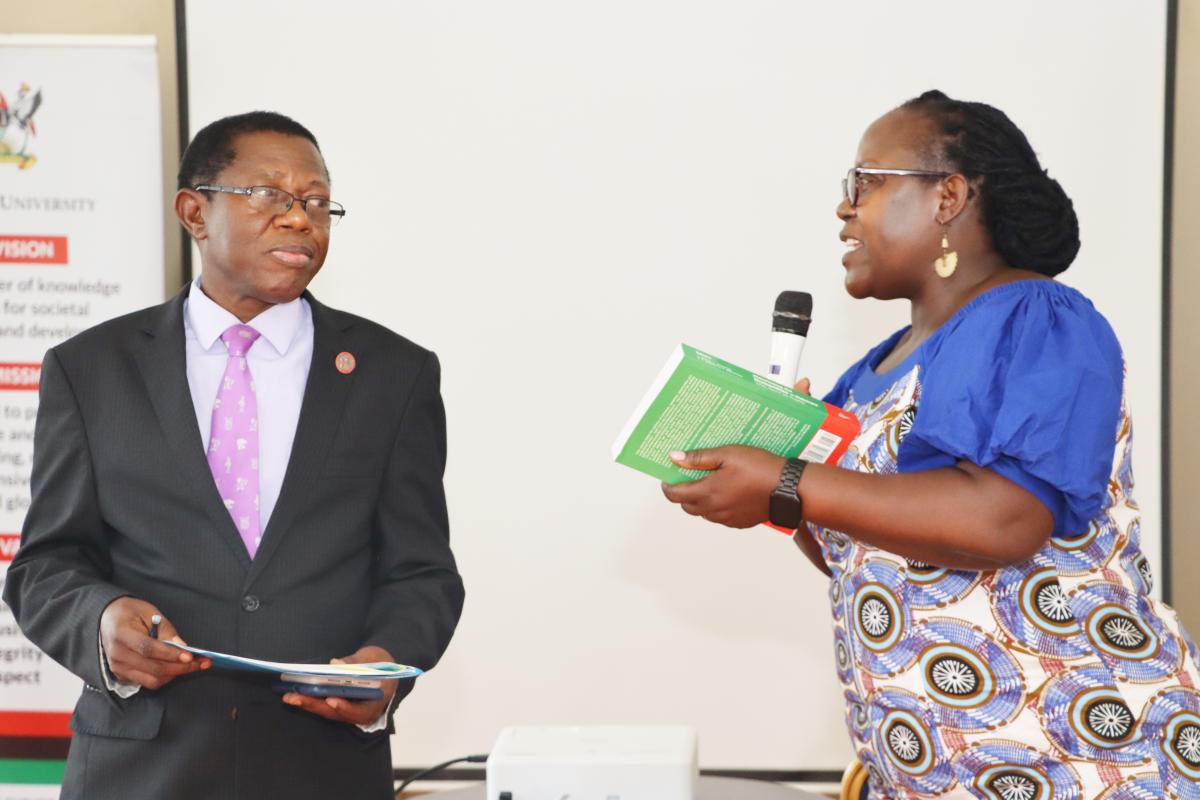 Addressing participants during the opening session, the Principal CHUSS, Prof. Josephine Ahikire expressed pride that the fact that they were able to complete what they promised within the three years project, is no mean achievement.
Addressing participants during the opening session, the Principal CHUSS, Prof. Josephine Ahikire expressed pride that the fact that they were able to complete what they promised within the three years project, is no mean achievement.
In this journey, Prof. Ahikire said, one of the aspects was to up the literature in terms of alternative knowledge and knowledge produced from the Global south- that - which has the political subject of decolonization.
She explained that one peculiar aspect as they interact with students while writing their proposals, is that, the first pages have been characterized by literature and knowledge stemming from the then dead white men while Africans feature around the findings of the study.
The argument she said has been that, maybe faculty has not armed students well enough to theorize African experience to take all knowledge around them as knowledge, and, African scholars as philosophers.
“Who are the African scholars and what time do they come in the curriculum? At the end of the curriculum when the semester is ending. Dead white men are the ones characterizing political sciences curriculum. In Gender studies, African Feminism comes at the end of the curriculum and sometimes we tell students that, these ones you can read on your own”,
So, we are saying, there is something we need to do differently, we have collected views but we think more than this edited book, we need to take another step, we need to jump because that is what will truly make us Humanities and Social Sciences and take us back into our rightful place of Makerere of the 60’s and 70’s when everything was destroyed and human spirit was alive. The scholars in the humanities have kept the societies going and we need to keep that spirit going”, The Principal explained.
She also reported that under the project, CHUSS on its own procured a range of books to secure the literature in the university library resulting from a negotiations with the Mellon Foundation. She implored staff to utilize them in teaching.
Decolonisation and its bearing on the Curriculum at CHUSS.
Speaking from the point of decolonization, the key note speaker who is also Director Makerere Institute for Social Research Prof. Lynn Ossome challenged scholars that in their curriculum and all that they are doing, they must understand their work and themselves as located in their subjects constructed by history and should also continuously influence and make deliberate decisions.
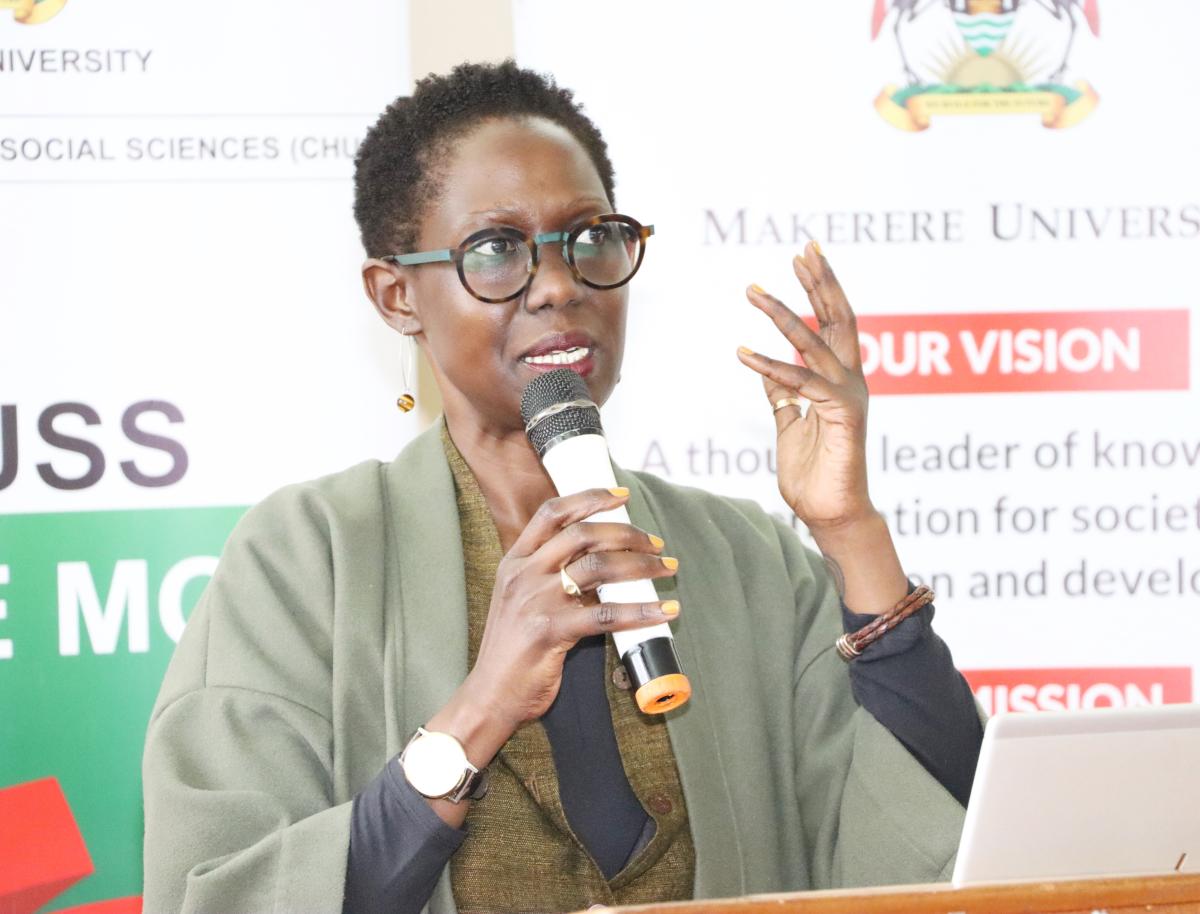 “What is at stake, is the future of higher education itself. We are charged with the responsibility of training a new generation of thinkers, policy makers and leaders. Are we training people who see themselves in the things that they speak about, write about and the politics that they play? Or are we training young people that are still guided by a canon in effect that raised us in our complexity, in raised sinisters in terms of our historical subjectivities”, She asked.
“What is at stake, is the future of higher education itself. We are charged with the responsibility of training a new generation of thinkers, policy makers and leaders. Are we training people who see themselves in the things that they speak about, write about and the politics that they play? Or are we training young people that are still guided by a canon in effect that raised us in our complexity, in raised sinisters in terms of our historical subjectivities”, She asked.
Prof. Ossome contended that curriculum review itself is done as a political act and therefore as teachers located at Makerere University in Uganda, they are designing and delivering content that is going to inform and affect how they see themselves and the lives of people they are called to impact as a university.
“I still think of ourselves as working, thinking and living through the colonial register. For those who have been written out of the canons of knowledge, we have to re-state again and again our claim”.
“…In the space of the curriculum and in relationship to the outside world, the curriculum and pedagogies we develop are the strongest tools that we have at our disposal. So we have to think about what do and what we want the curriculum to inform us. If we don’t want to talk about decolonization as a broad universal abstract term, how do we think about it from the vantage point not only of Africa but Uganda.?” Prof. Ossome added.
“What do we want our curricultum to do? What pedagogies can we develop that can express the intensions we have? It is about the how-which is a deep methodological question, with how-which is a deep disciplinary question. Are we talking internally to ourselves or are we talking to other disciplines and how do we manage disciplinary tensions” She questioned
Defining decolonization as the undoing of colonialism, Prof. Ossome said disentangling from colonialism requires multi-layered processes that involve not only political but also economic, spiritual, educational, psychological and cultural displacements of the colonial logic.
For the purposes of the academy Ossome said, decolonization and undoing colonial processes and logic takes particular meanings and understandings for curriculum and for pedagogy in higher education across disciplinary, institutional and global context.
One of the major meanings of decolonization according to Prof. Ossome is recognizing the constraints that are placed in in the hierarchies, in ones disciplines, the hierarchies that are placed by institutions, by the profession, policy and by society.
Aware that such knowledge constraints are starting points of decolonization, Prof. Ossome said, such constraints are tied to knowing the privileges of the existing histories, policies, practices and methodologies and theories and addressing them in the curriculum.
She highlighted the usual problematic methodological and thematic assumptions, orientalism, secularism particularly, racism that undermined the disciplines such as the implication of the 19th century sociology and especially anthropology, the 20th century political science, economics and the deterministic political economy among others.
“There is no way to do decolonization completely and seriously if you are not also thinking seriously about the question of our sovereignty as nations and questions of imperialism because colonialism cannot exist outside these structural issues”, she warned.
The professor expressed the intrinsic need to carry out interdisciplinary work about the natural sciences and social sciences while being mindful that inter-disciplinarity has a serious methodological question at its core partly because the disciplines have been so self-contained.
Book Chapter Reviewers
The chapter reviews were conducted by Associate Professor Susan Kiguli, Dr. Simon Rutubajuka, Prof. Robert Kabumbuli and Dr. Paddy Musana followed by l plenary discussions.
Prof. Susan Kiguli reviewed four book chapters. Chapter 3: Literature’s Raison D’eter: Disciplinary limits of the Art - Past and present by Dominica Dipio. focuses on Literature as a discipline plus its unique place in human development. It emphasises the story tellers and artists as keepers of the state’s memories and careers or dreamers of new visions thus orative and written literature are central to any nations development.
The chapter argues that Literature is embedded art where the historians , philosophers, musicians and performers are intertwined in one person. So the chapter highlights the interdisciplinary and disciplinary nature of both orative and literature.
In reviewing the history of the English department at Makerere University, the chapter highlights the component of the founding of the Makerere university colleges Free Travelling Theatre in East Africa in 1966. In this program, community outreach in the mode of take Makerere to the people was emphasized. So the chapter points out that service to community was anchored in performance particularly drama in a bid to transmit cultural values but this inadvertently made communities engage with vital issues for discussion, self-questioning and transformation.
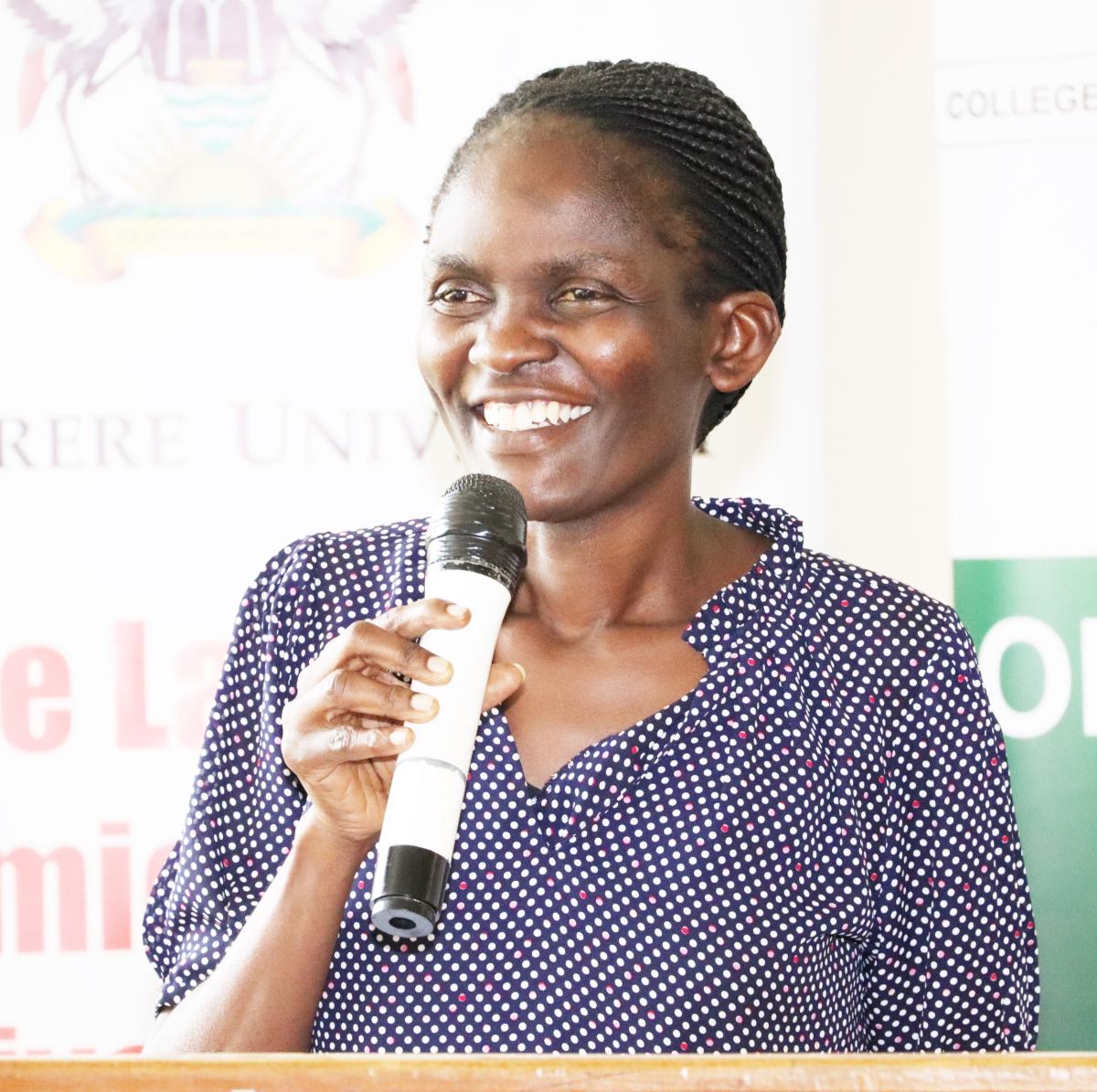 The chapter proposes the setting up of a centre for creative writing in honor of David Cook who contributed an endowment fund to start this venture. In addition, the chapter reemphasizes the centrality of the teaching of orature to promote indigenous knowledge production and to secure as Nicere Mugo put webnar 2020 from amnesia.
The chapter proposes the setting up of a centre for creative writing in honor of David Cook who contributed an endowment fund to start this venture. In addition, the chapter reemphasizes the centrality of the teaching of orature to promote indigenous knowledge production and to secure as Nicere Mugo put webnar 2020 from amnesia.
The chapter discusses the proliferation of Shakespearean plays in secondary schools and singles out Mawalimu Nyerere’s translation of Julius Ceasor and merchant of venice into Kiswahili and the issue of promoting writers who write in African languages.
The chapter in general advocates for the promoting of the practical angle in Literary studies and argues that luminaries of the department pushed for that cohension in practicing theory, creativity, performance and community outreach. And also recommends active collaboration with the writing fraternity groups such as FEMRITE, AWT, IBUA Lantern Meet of poets and Kitara Nation Poets.
Prof Kiguli also reviewed Chapter 4: Historicising the role of the department of Performing Arts and Film in the development of Theatre in Uganda by Nicholas Ssepijja)
The chapter maps out the evolution of the department of MDD and later PAF particularly in the context of MUK and the education system in Uganda. In general, it discusses the unavoidable colonial period question and its impact on education curriculum in Uganda and the transition into what the chapter positions as the post-colonial period and context and the scission will pull over the problematics of viewing that post colonial at the expense of post colonial context .
The chapter points to performing arts being a discipline that is anchored in the framework of daily life and- the department of Literature highlighting the revolutionary spirit of these disciplines in their inclination to propose interventions and changes in knowledge production at local , regional and global level.
The chapter points out that because of the disciplines roots in live performance, the concern with community activities in promoting education and development are essential. The chapter advocates for more action centred understanding of theatre in order to galvanise African and in this case Ugandan theatre on particular.
The chapter raises concerns about the continuation of colonially oriented curriculum which makes the liberation of students minds to see from their own contexts very difficult.
The chapter has a section that discusses the contribution of Rose Mbowa to MDD department and to Ugandan theatre when she was head department from 1982 -7 and 1994.
she advocated for the admission of experienced theatre practitioners to the diploma program using the mature age scheme . She actively reached out to these people since she was actively a theatre practitioner and mentor.
The admission of these students provided them with an opportunity to improve their skills and professionalism because most of them were established achievers in theatre and music terrain in the country –they lifted the profile of the department and the university and opened up a chance for lecturers to learn more and research more. It is during this period that persistent questioning of what was being taught gained center stage
The training of students with experience in performance also led to the formation of troupes commonly seen popular performance concerts in Uganda such as Ndere troupe, Mulago theatre kings etc
The training of practitioners ensured a dialogue between the department and those in the field with mature age scheme the government managed to recruit a number of graduates to teach music in secondary schools and other levels.
Kiguli also reviewed Chapter 5: From generative grammar to computational linguistics exploring English and linguistics scholarship at Makerere university by Levis Mugumya.
The chapter discusses the emergence of English language at the inception of the technical college in 1922. It looks at it subsequent establishment as subject and medium of instruction and its current position as part of university wide communication skills programme.
The chapter also focuses on linguistic scholarship as a foundational discipline in language study and research. It uses a historical approach to understand the native and basis of English language and linguistics by examining their emerging trends and patterns as exploring continues and discontinuities within the existing structures and frameworks of neoliberal reforms and market driven forces.
The focus on English stems from its dominance in the education system in Uganda. The chapter reflects on the linguistics debates in colonial Africa that influenced language policy and planning. It traces the teaching of English and its positioning as a medium of instruction for all courses at Makerere since 1922.The chapter examines English’s sway as a medium of instruction research and dissemination of academic knowledge.
The other book section reviewed by Susan Kiguli was Chapter 6 ; A peripheral Archive or a discursive plantform of post- colonial Uganda historicizing trauma I penpoint by Edgar Fred Nabutanyi and Isaac Tibasiima.
This chapter focuses on the contribution of the English department through its literary magazine penpoint in the context of the Ugandan decolonial debates of the 1960s.
The chapter explores the roles of the literary magazine first as a platform that galvanized the debate on the decolonization project of the 1960s.That this was a training and mentorship ground for the first cohort of African writers.
The chapter focuses on selected texts both short stories and poems and shows how the magazine was an important arm in the Ugandan public discourses.
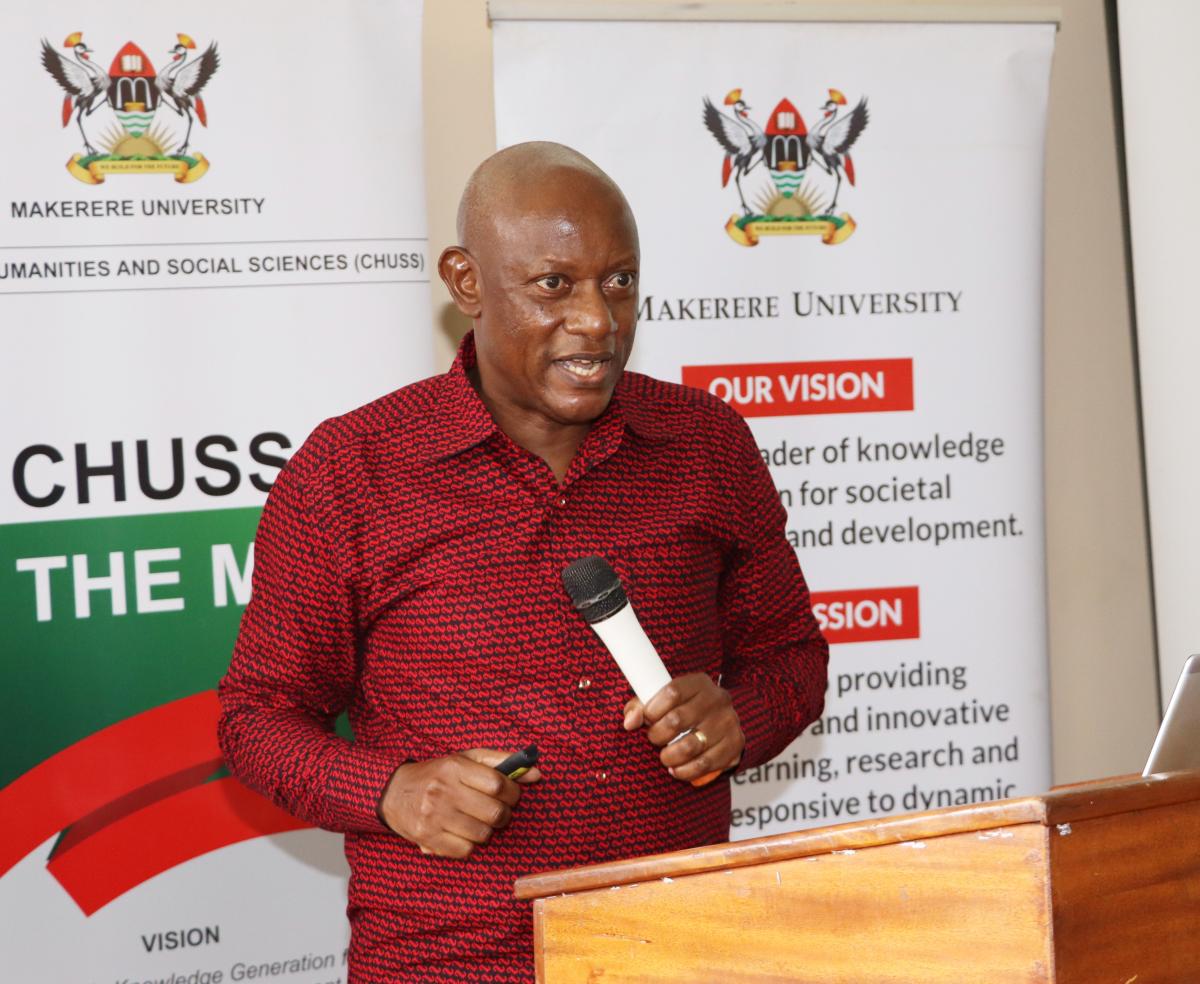 Penpoint was started in the department in 1958 and that it was an avenue in which budding writers debated the material reality of the decolonial moment and in which they responded to the national emergency.
Penpoint was started in the department in 1958 and that it was an avenue in which budding writers debated the material reality of the decolonial moment and in which they responded to the national emergency.
The chapter demonstrates that Makerere University’s department of English literary journal penpoint as a platform to debate important issues that affected the Ugandan society of the 1960s especially the political violence and upheavals that characterized this period.
The chapter demonstrates how a university based literary magazines gave room to university students to debate issues affecting their communities and to their department and large community during the national upheavals and how the tradition of literary magazines can be revived and what form and funding it should take.
Dr. Simon Rutabajuuka reviewed two chapters:-Chapter 7: History Studies at Makerere university: Crisis and Optimisms by Pamela Khanakwa and Chapter 8: Historicising Archeology in Ugandan Higher Education at Makerere University by Elizabeth Kyazike and Asmeret Mehari.
Prof. Robert Kabumbuli reviewed another four chapters. Chapter: 9: Tracing Peaks and Troughs of Social Anthropology of Makerere University by Peter Atekyereza and Stevens Aguto; Chapter 10: International system, Individual Dynamics and the critical junctures of political theory at Makerere by Edwards Silvester Kaweesi; Chapter 14; Birth of Women Studies Displine and Trajectory at Makerere University by Grace Bantebya Kyomuhendo and Fredric Immanuel Kindi and; Chapter 15: Psychology at Makerere University: Patterns, Trends and the Future by Julius Kikooma.
The other reviewer, Dr, Paddy Musana also reviewed four chapters. Chapter 1: Emergency and Evolution of Philosophical scholarship at Makerere university : Challenges and Opportunituies by Edward Wamala; Chapter 12: Philosophy and the public: Its Alture and contributions in the Arts and Social Sciences at Makerere university and Beyong by Archangel Rukooko Byaruhanga and; Chapter 13: Tracing the Historical Trajectory of Religious Studies at Makerere University by Christine Mbabazi Mpyangu and Chris Tuhirirwe.
Workshop Recommendations for Curriculum Transformation in CHUSS
A number of proposals came out of the keynote and chapter reviews:
- A need to develop and keep a cautiousness about the value of interdisciplinary, multidisciplinary, disciplinary and trans-disciplinary aspect with invitation to come out of the silos to ensure faculty undertakings hold the conversations up across disciplines. However, the discipline specifics should not be lost into the process of transforming into interdisciplinary, multi-disciplinary and trans-disciplinary dimensions.
- There is the need for faculty to be aware and to devolve in the philosophies that inform all disciplines even as they approach as developers of particular courses. Each discipline must be aware of the philosophies that inform it.
- It was also observed that curriculum has tended to centre on personalities. Building curricular and centering them around personalities becomes unsustainable in the future hence the need to broaden that and think how young academics can be mentored to be innovative and contribute to the conversation that are key in society.
- It was also proposed that there is need to having writers residences and other incubation centers to create a deliberate time within which to give idea.
- It is also important to be very cautious of stakeholders in the conception, planning and delivery of curriculum and some of the very key stakeholders are the students who should be listened to and getting cautious of the world around.
- It was observed that students do not like reading and one of the fundamental questions is why are they not reading and what they think about what they are doing. There are some students who get jobs even when they don’t attend classes. There is need to engage stakeholders for them to participate and for lecturers to design strategies to understand what is going on and understand which programs enhance dissemination, popularization of the curriculum to enhance value and marketability of our stakeholders.
- There is need to create awareness of the curriculum to avoid any misconception and aspects of stigmatization around some disciplines through rebranding and finding innovative ways of delivering their content.
- It was also noted that there is resistance among academia to change which affects reviews of curricular initiatives in units, hence the need to work on mindset change and create awareness. Other critical question raised by one of the authors is the faculty readiness as curriculum developers and deliverers of the curriculum to deliver or make the changes that are required.
- It will also be required to enhance teaching, training and research collaborations to enhance innovative curriculum development, research into curricula to inform teaching and learning processes as a way of having a transformative curriculum that is responsive to the changing times and needs of communities.
- There is also need to retool academia to put the transformative curriculum and constantly revise their tools, technologies and update their philosophies. The motive of philosophy is extremely important. The aspect of critical thinking is lacking among products produced an extent that it reflects on instructors hence retooling is important.
- There is need to integrate local indigenous content into the curricula, integrate African philosophies on epistemologies, methodologies and practices in teaching. What is fundamental to all these is to have a game plan and be cautious of beginning also to build silo. In efforts to push for indigenous content, there is need for a strategy for continuous improvement of that particular content and a strategy for creating that capacity through more workshops and trainings on theorization.
- Applauded that curriculum should provide room for cross cutting courses in areas of communication, ethics, gender, governance among others to produce the human being with feelings and consciousness.
- Curriculum review should be anchored by a comprehensive and systematic reviews opposed to merely responding to statutory requirements. The systematic review should include the changing ideology, philosophy and markets.
- There are financial implications that the question of funding curriculum reviews is fundamental, challenges and bottlenecks are at every stage to institute a transformative curriculum but borrowing through this particular initiative with partnerships for funding, it is important to be proactive, optimistic beef from successes and mobilize resources to enhance the implementation of curriculum.
What next for CHUSS?
The Project Coordinator Dr. Levis Mugumya said the college units are expected to provide a comprehensive plan in the implementation of these proposals, see what is involved and required to forward.
The document will be shared with the college board after refining for discussion to become one of the documents to guide curriculum transformation at the college level.
“We invited Deans, Heads of Departments, program coordinators and these are the key stakeholders in the college. And it so good you came and witnessed these conversations.
“There are many things that we can do at individual level, departmental, school level and finally at college level. We need to do something and the beginning is now. When we run such projects at college level, we use the steering committee of Deans as the mechanism for quality assurance and accountability and we have seen that it is a mechanism that works”, Dr. Mugumya stated.
Former Deans on the Project Steering Committee Recognised
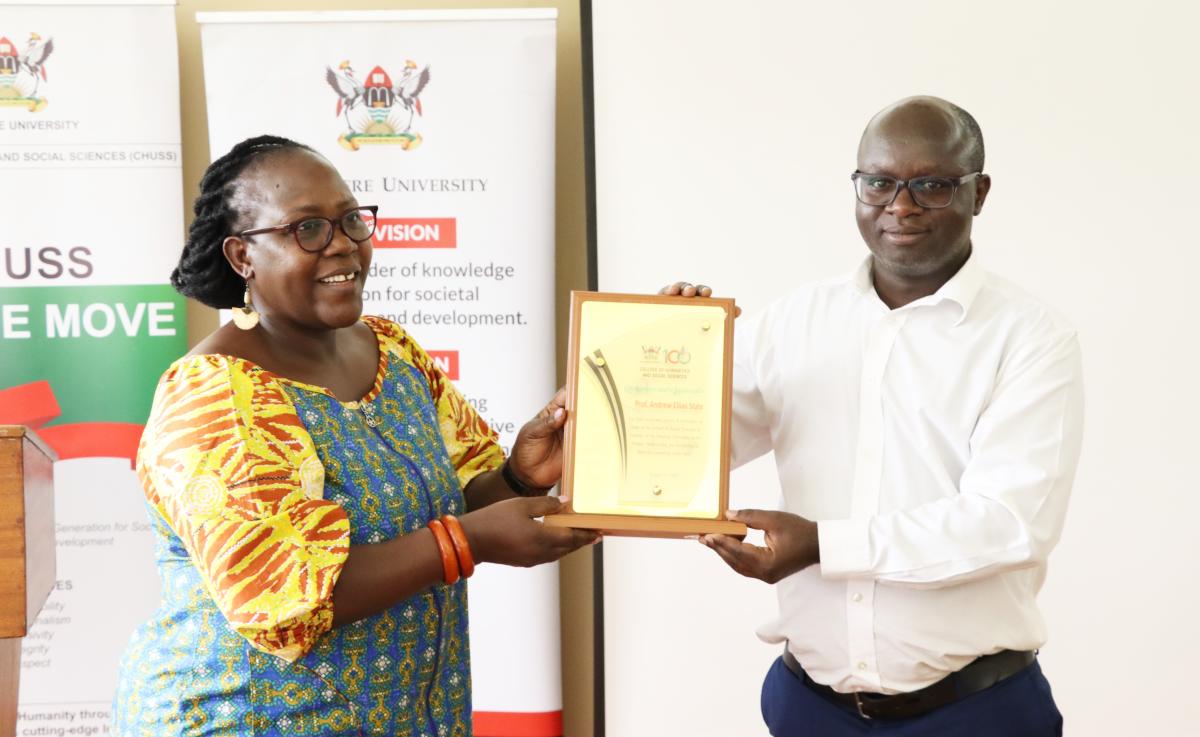 In the workshop, Deans and the Deputy Principal who have served on the project steering committee were recognized and appreciated for their honorable service and dedication.
In the workshop, Deans and the Deputy Principal who have served on the project steering committee were recognized and appreciated for their honorable service and dedication.
They included Prof. Patrick Mangeni, former Dean School of Liberal and Performing Arts, former Dean, School of Psychology Prof. Grace Milly Kibanja , former Dean, School of Social Sciences Prof. Andrew Elias State as well as the former Deputy Principal Prof. Julius Kikooma.
